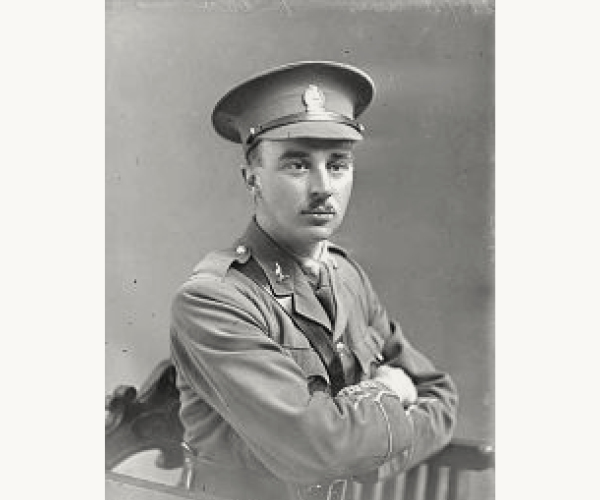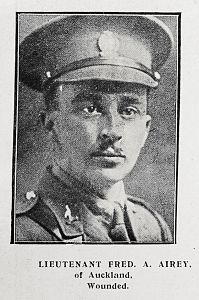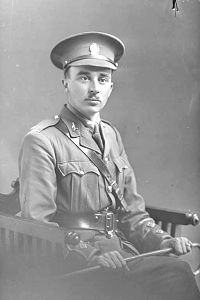WW1 Lieutenant Frederick Arthur Airey 30102
Frederick Airey was born in Auckland on 9 May 1892, the son of Margaret Avon Airey and Walter Henry Airey, an inspector of schools under the Auckland Board of Education.
He attended Remuera Primary School, Auckland Grammar School from 1905 and was a member of the College Rifles Rugby Football Club. At Auckland Grammar he was a gifted scholar and sportsman in rugby, cricket and athletics. He attended Auckland University College from 1911 to 1915, gaining an M.A with first class honours in English and French. He was a popular student and was appointed President of the Students’ Association. He was selected as the Auckland candidate for the Rhodes Scholarship, but did not eventually win that honour. He was president of the Musical Society, editor of the College Magazine, vice-president of the Literary Club, member of the committee of the cricket club, and selector and member of the committee of the Cercle Moliere. He performed regularly with the Ponsonby Shakespeare and Rhetoric Club. He had been a member of the Auckland Grammar School Cadets and in 1912 he was a member of the Auckland Infantry Signal Company.
He returned to teach at Auckland Grammar School as an assistant master and had already passed the examination with distinction to become a lieutenant with the Territorial Force when war was declared in August 1914. He enlisted in Auckland on 24 July 1916, in the 2nd Battalion, Otago Regiment with the rank of Lieutenant. He sailed from Wellington as Lieutenant with the 22nd Reinforcements E Company on the 13th February 1917, on the Vessel “Mokoia”, bound for Plymouth, England, reaching there on 2 May 1917.
He proceeded to Sling Camp in Wiltshire for further training before being posted to Etaples on 4 June 1917. He was wounded in action twice, treated in the field hospitals before being discharged for duty and returning to the field both times, but on 30 September died of a gunshot wound to the head at the Battle for Polygon Wood. he was 25 years old.
He is buried in the Lijssenthoek Military Cemetery, Poperinge, West-Vlaanderen, Belgium. His name is included on memorials at Remuera Primary School and Auckland Grammar School. The Ypres sector had seen the best part of four years of trench warfare fighting concentrated into a narrow area of ground to the north, east and south of the town of Ypres. As a result, many thousands had died in the daily grind of “Tours of Trenches” or in an attack on the enemy line. At the end of the First World War, there were many hundreds of military burial grounds. They ranged in size from large cemeteries located in or near a village or town which had been behind the old Front Lines to small groups of battlefield burials and individual plots. Lijssenthoek Military Cemetery is the resting place of 10,755 casualties of the First World War. It is the second largest British and Commonwealth cemetery in Belgium. There is a family grave at Purewa Cemetery, Meadowbank.
“Sed Miles, sed pro Patria.” Auckland Grammar School chronicle. 1917, Third term. pp.10-11
LIEUTENANT FREDERICK ARTHUR AIREY
Of the long roll of old boys who have laid down their lives for King and Empire, none was more gifted and richer in promise that Lieutenant Frederick Arthur Airey. His school career was one long series of successes, both in classroom and out of doors; while his bright, modest and cultured character made him loved and respected by all with whom he came into contact. He was a son of the late Mr W H Airey, BA, who was for some years Inspector of Schools under the Auckland Education Board and came to us in 1905 as a Junior National Scholar from the Remuera School. In the following year, he won a Senior District Scholarship. In 1910, his last year at the school, he left us with a record which stamped him as one of the ablest of the many distinguished old boys of whom the School is justly proud. In that year he won both first prizes in the Upper Sixth and the senior “Eric Hooton Prize” for English essay, and obtained second place in the Junior University Scholarship examination; while, in addition to these scholastic successes, he played fullback for the First Fifteen, and captained the School Eleven which won for the first time the Heathcote-Williams Shield.
His University career was equally brilliant. In 1912 he won the premium for French at the Auckland University College, and in 1914 graduated BA, gaining at the same time the Senior Scholarship in English and French. At the University College, he kept up the various athletic activities which he had cultivated at School. He was a member of the University Eleven and found the time to become a good tennis player. He also took a prominent part in the work of the various College societies, and the students showed their appreciation of his high character and ability by electing him to the office of President of the Students’ Association.
As was only to be expected, with such a School and College record, F A Airey was selected in 1915 as the Auckland candidate for the Rhodes Scholarship. The selection gave great pleasure all who had come under the influence of his charming personality, and, in the opinion of those most competent to judge, Fred Airey combined in an unusually high degree all those qualities of intellect, manhood and leadership which Rhodes had in view when he founded this Scholarship. Had he gone in happier times to Oxford, Lieutenant Airey would without doubt in that old-world, scholastic atmosphere have brought to maturity the qualities of a literary statesman, with which he was endowed in an unusual degree.
Everything that he did, whether in the classroom or on the athletic field, was characterised by method, neatness, and good style. He had a genuine love for literature and art, and after leaving the University to become an Assistant Master at his old School he devoted a good deal of his leisure to the study of music. He was one of the most stylish bats that this School has produced, and his neat, clean off strokes especially were much admired by all followers of the game. In was in the cricket field, too that he first showed the qualities of coolness and good judgement which marked him out as a leader of men. It was due chiefly to his captaincy that the School first won the Heathcote-Williams Shield. At a critical stage in each innings, he inspired his team with confidence by his careful yet vigorous batting (his scores were 46 and 42); and by his judicious handling of the bowling and placing of the field in the final innings of the match, he out-generalled his opponents and won victory for his side. Those who were present at the match still remember the neat, well-expressed and sportsmanlike speech which he made when he received the Shield on behalf of the School.
Lieutenant Airey was of such a bright, generous and philosophical temperament that he felt no great disappointment when another candidate was chosen for the Rhodes Scholarship and was “quite happy” to use his own words, “to do some useful work for the country to which he owed so much.” This was very characteristic of his modest, lovable nature, for he got such a full pleasure out of his work, his games, his reading and his music that he was smilingly indifferent to the mere worldly successes which the many covet so much. Though he was cut off at the early age of 26 from a life that was rich in its promise of usefulness, yet the influence of his character and his achievements will survive him and be an example to succeeding generations of boys. To his mother and his relatives, his old schoolfellows and masters extend their deepest sympathy in the loss of so bright, gifted and lovable a personality. [1]



